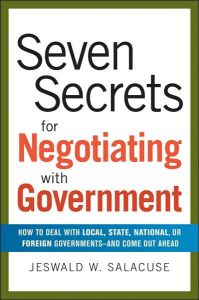Join getAbstract to access the summary!

Join getAbstract to access the summary!
Jeswald W. Salacuse
Seven Secrets for Negotiating with Government
How to Deal With Local, State, National, or Foreign Governments - and Come Out Ahead
AMACOM, 2008
What's inside?
Whether you sell tanks or need a zoning permit, you can optimize your negotiations with government and get what you want.
Recommendation
Professor Jeswald W. Salacuse does a masterful job of presenting his techniques for negotiating with government units. He breaks down the negotiation process, and explains the hidden agendas common to all types and levels of governments – national, state, local or foreign. He buttresses his suggestions with actual examples of what has worked and what has failed. Whether you’re going to City Hall or Capitol Hill, getAbstract recommends this manual to citizens and vendors alike. Salacuse’s clear presentation will prepare you to get what you want, from a government contract to buy your jet plane to a permit to build a new patio.
Summary
About the Author
Jeswald W. Salacuse is a law professor and former dean at the Fletcher School of Law and Diplomacy at Tufts University, and a faculty member of the Harvard Program on Negotiation. Former dean of the Southern Methodist University School of Law, he has participated in and observed negotiations in more than 50 countries. His books include Leading Leaders, The Global Negotiator, The Wise Advisor and Making Global Deals.

















Comment on this summary